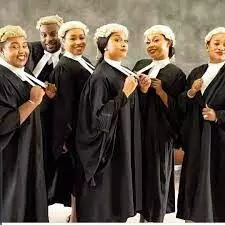Sexual harassment, patriarchy reducing number of female litigators in Nigeria – Lawyers

Ms. Amaka Ezeno, former Chairman, Nigerian Bar Association (NBA), Awka Branch, says sexual harassment, violence, and patriarchy are some of the reasons female lawyers abandon active legal practise.
Ezeno made the assertion at the 3rd Memorial Colloquium in honour of the late Chief Cyprian Anah, a Senior Advocate of Nigeria (SAN), organised by the Anah Law Practise in Onitsha.
The colloquium had the theme ‘Practical Management: The Heart Beat of Every Impactful Legal Career’.
She lamented that the loss of female litigators in the country was an under-recognized phenomenon seriously impacting the legal profession, especially in the area of litigation.
According to her, many women are excelling in law school and becoming lawyers in numbers roughly equal to men, but the bad news is that women are not sticking around to practise.
“According to a report from the International Bar Association (IBA), currently, only four out of 37 Attorneys-General in the country are female, and four percent of senior advocates in Nigeria are female.
“Out of the 128 NBA branches across the country, only five are currently headed by women. In the judiciary, only one woman has ever been the Chief Justice, and in the Court of Appeal, only two women have been the President.
“This gross underrepresentation of females in senior legal positions is attributable to sexual harassment, violence, family pressure, limited maternity policies, a lack of creche facilities, and convenience in courts.
“Also, the misogynistic perception of female capacity in a largely patriarchal society where only male litigators are mostly preferred by law firms as litigation is seen as'men's work’,” she said.
Ezeno said it would require the collaboration of the governments, judiciary, founders of law firms, and NBA to address the challenges and encourage female lawyers to get to the peak of their careers.
“Owners of law firms should employ and provide a safe and healthy working environment for female lawyers devoid of any form of violence or harassment.
“The legal profession should ensure enforcement of the NBA’s sexual harassment policy, aimed at creating a safer working environment for women.
“The judiciary should endeavour to provide a lounge, canteen, creche, and comfort room among other facilities for lawyers, especially female lawyers, while waiting for trials to begin or during recesses in court.
"Also, female lawyers should have successful mentors, believe in their abilities, eschew low self-esteem, dress properly, attend conferences to improve, and be assertive, “she advised.
Also speaking, Chief Judge of Anambra State, Justice Onochie Anyachebelu, said female lawyers had lots of distractions, such as marriage, which made them unstable in legal practise.
“There are several female lawyers who are very intelligent and hardworking. But because of these distractions, they have a lot of limitations.
“As a married female lawyer with children, you do not expect the private practitioner to offer you the type of maternity leave the government will give you. I advise the private practitioners to look for ways to accommodate women.
“On our part as government, we will continue to create a conducive and enabling environment for legal practise, including the provision of basic facilities,” he said.
Earlier in her remarks, the convener of the colloquium, Ms. Adaeze Anah, said the event was to drive intellectual exploration and legal reforms in the country.
“Many of my late father’s colleagues described him as an intellectual giant, a pathfinder, a fearless advocate per excellence, an astute and selfless bar man who made positive contributions to the legal profession.
“This colloquium is to continue his legacy. The speakers are to explore the challenges confronting the legal profession and perform corrective surgeries on our jurisprudence to advance the course of justice and human rights in Nigeria,” she said.



